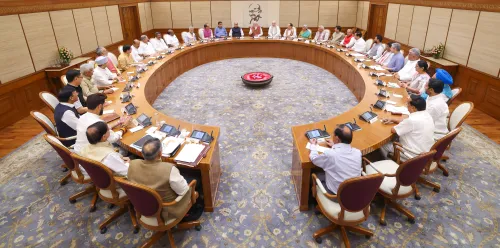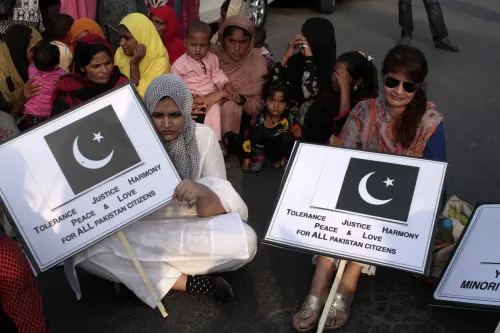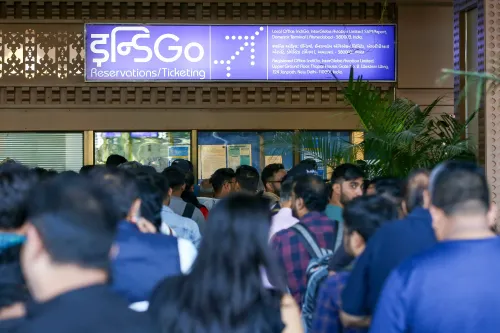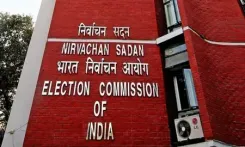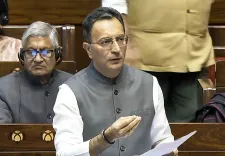Next Court Session on Ajmer Dargah Shiva Temple Claim Set for May 31
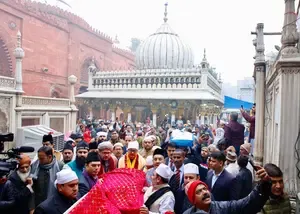
Synopsis
Key Takeaways
- Next hearing on May 31
- Petitioner claims Shiva temple exists at Dargah site
- Government departments involved in the case
- Historical evidence presented by Vishnu Gupta
- Previous hearings affected by external factors
Jaipur, April 19 (NationPress) The court hearing concerning the assertion of a Shiva temple being located within the sanctum sanctorum of the Ajmer Dargah has been postponed, with the next session now set for May 31.
Previously, a stay application was filed by the petitioner, Vishnu Gupta, asking for the government departments to halt the offering of chadar at the Dargah. In response, both the Ministry of Minority Affairs and the Archaeological Survey of India (ASI) provided their statements in court.
Advocate Yogendra Ojha mentioned that the hearing was delayed due to newly submitted petitions and the absence of the Supreme Court counsel, who was unavailable because of the inauguration of a new District Court building.
It is worth noting that a prior hearing on April 19 was also delayed after the District Bar Association supported the Ajmer Bandh in connection to the Bijaynagar incident.
The initial petition was brought forth by Vishnu Gupta, the National President of the Hindu Sena, claiming that the Ajmer Dargah is situated on the site of an earlier Hindu temple. In response, the Dargah Committee filed a motion to dismiss the case.
Moreover, the Anjuman Committee linked to the Dargah has submitted a petition to the High Court. Gupta bases his claims on three main points, asserting that the architectural style and carvings of the Buland Darwaza bear resemblance to those found in Hindu temples, indicating the prior existence of a temple at the location before the Dargah.
Gupta contends that remnants, which appear to be temple structures, can be seen in the domes and upper sections of the Dargah, suggesting it may have been built atop a destroyed temple. He also points to the presence of water features typically associated with Shiva temples at the site, reinforcing his argument.
He claims to possess a Sanskrit manuscript titled Prithviraj Vijay, dated to 1250 AD, which he plans to submit to the court along with its Hindi translation.
This manuscript allegedly contains historical references to the past of Ajmer, with Gupta asserting that the Places of Worship (Special Provisions) Act does not apply to the Ajmer Dargah, asserting it is a religious site not governed by the Act.
He cited arguments made by lawyer Varun Kumar Sena in the Supreme Court regarding this matter. Following Gupta's request, security has been granted to him under the direction of SP Vandita Rana.
Vishnu Gupta, as the National President of the Hindu Sena, filed a petition in the Ajmer Civil Court claiming that the site of the Ajmer Dargah was originally the location of the Sankat Mochan Mahadev temple.
The court accepted Gupta's petition on November 27, 2024.
Subsequently, notices were issued to the Ministry of Minority Affairs, the Dargah Committee Ajmer, and the Archaeological Survey of India (ASI). Various other parties—including the Anjuman Committee, Dargah Diwan Ghulam Dastagir (Ajmer), A. Imran (Bangalore), and Raj Jain (Hoshiarpur, Punjab)—have also sought to be included in the proceedings.
As of January 24, there have been two hearings.
In support of his claims, Gupta referenced the 1911 publication Ajmer: Historical and Descriptive by retired judge Harbilas Sarda, which states that materials from a Hindu temple were utilized in constructing the Dargah.
The petition also claims that a Jain temple once existed in the sanctum sanctorum of the site.



